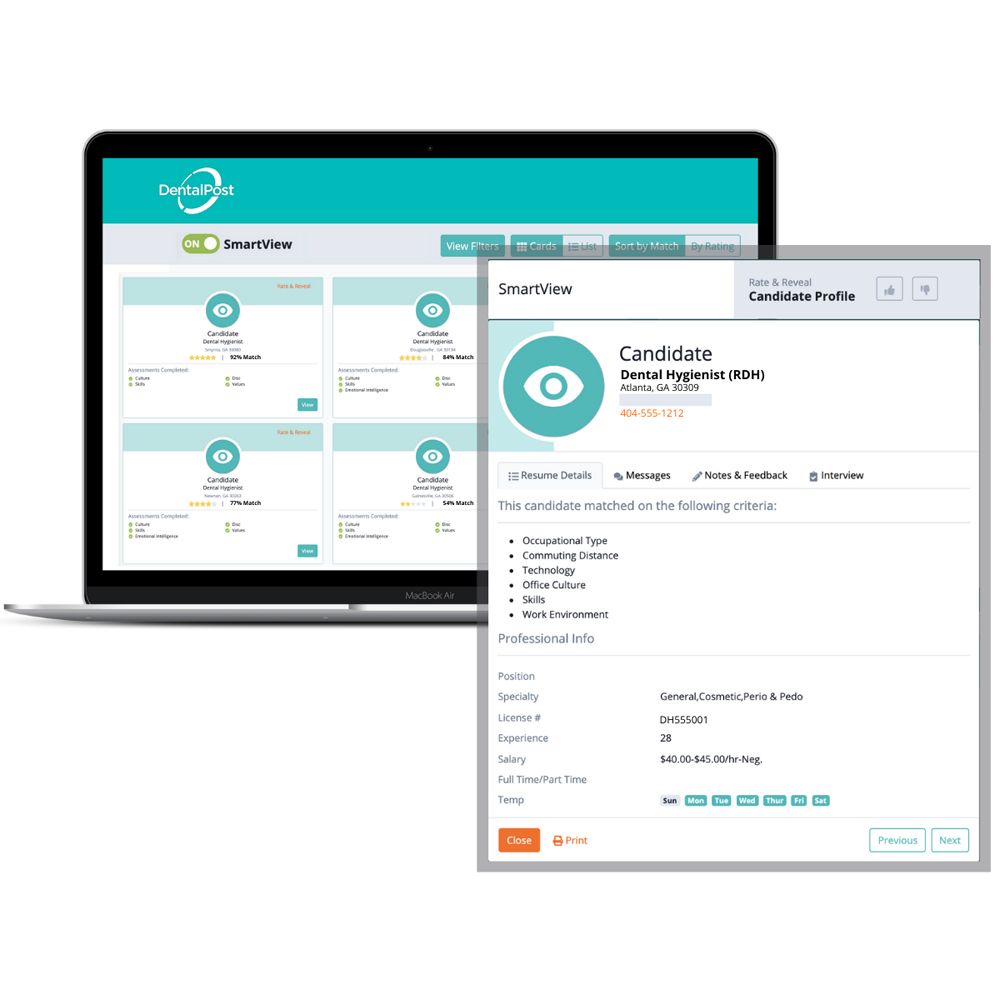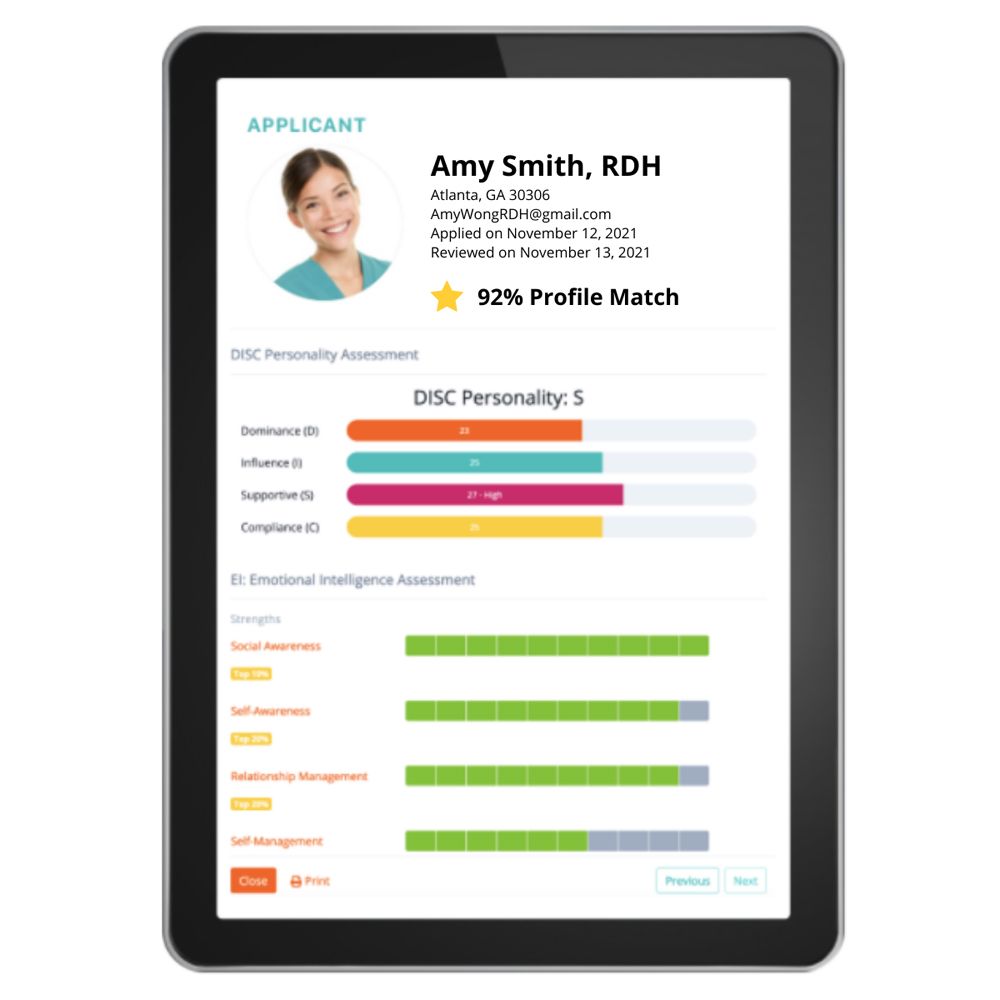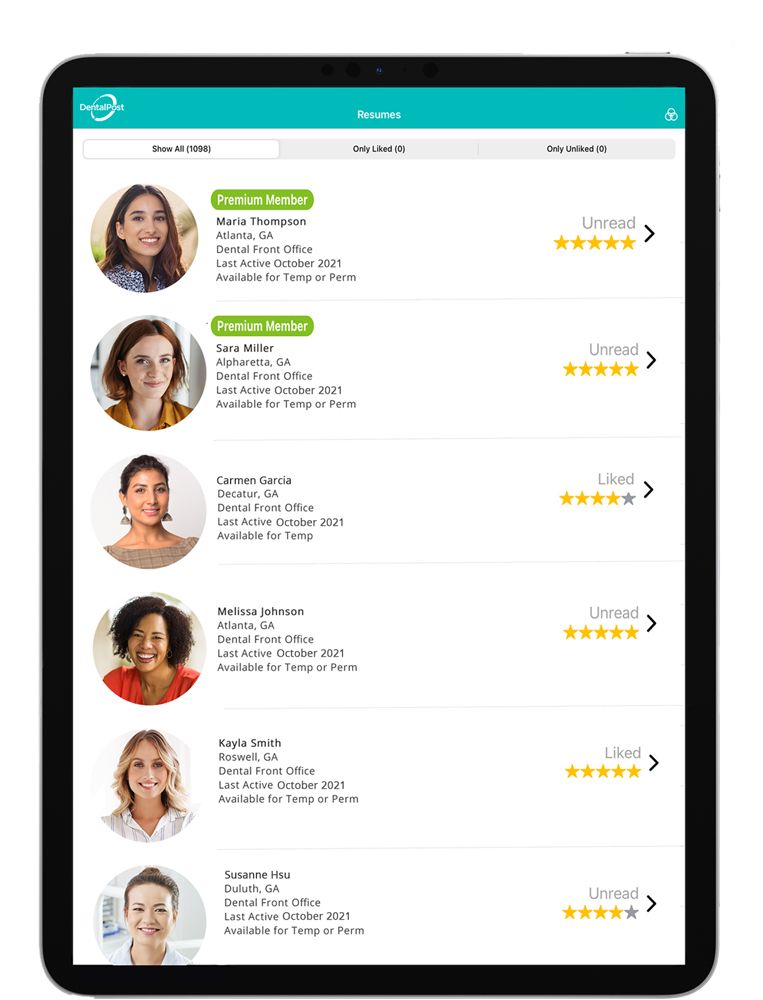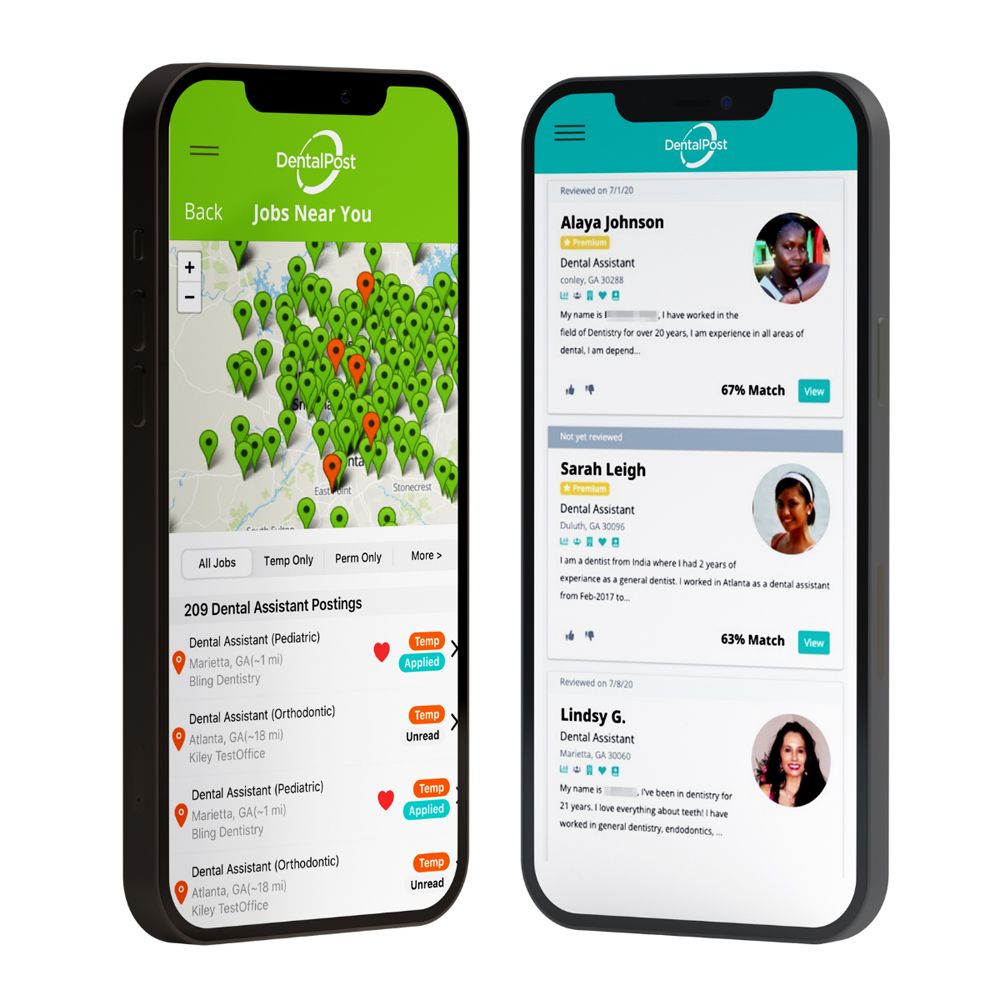Using Data to Make a Better Hire
Screening and assessment tools can assist in ensuring you make the best hire for your dental team.

What if I told you that even in a tight labor market you can use data to attract more candidates, build a better recruitment plan and retain the team you already have? Would you believe me?
It seems counterintuitive, because we think of a data-driven hiring process as a “screening out” scenario, where the more data and filters we apply the more restrictive the outcomes are. And in this labor market filtering seems like a luxury. But that’s not always the case. For years I’ve warned about the cost of a bad hire and how we can avoid it by using data. I still believe that, even in this market. Because when times and resources are tight, it’s even more important to make informed decisions for your business and your dental team. So, instead of thinking about data in the hiring process as a subtractive “screen out” process, I prefer to think of applying data as an additive way to attract the better candidates (and more of them) while not wasting time on the wrong ones.
Using Data For Better Recruiting Outcomes
• Salary & Job Satisfaction Surveys
When you know better, you do better. Or at least that’s how it’s supposed to work, right? When it comes to recruiting, research is our friend. How you present your job opportunity and your practice to potential dental professionals matters. When was the last time you investigated your own practice as a candidate would? How about the last time you researched what a high-converting dental job advertisement looks like? Or how standard benefits and compensation structures for dental professionals have changed by position in the last 6 months or year? It has changed—especially salary and workplace conditions.
When finding and retaining talent, competitive compensation and an empowering work culture are key.

Every year, DentalPost surveys thousands of dental hygienists, dental assistants, dental practice managers, and other front office team members on their level of job satisfaction as well as attributes of their workplace environment, practice leadership, employer recognition, financial compensation, benefits and more. Over the last 2 years, compensation has risen for many––but not all. There is a direct correlation between income level, job satisfaction, and the intention of survey respondents to apply for a new job.
The results of our recent surveys, which will be published in full detail in January 2022, indicate that those who received a pay raise in the last 2 years that exceeded a cost-of-living adjustment are the most likely to stay happily where they are. But open comments indicate job seeking is fueled by 2 desires: the desire for higher income and the desire to work at a higher level of professional potential. When finding and retaining talent, competitive compensation and an empowering work culture are key. It is essential to make those key factors visible to potential job candidates and actualized for your existing team members, too. Knowing this kind of informationbeforeyou write a job description and post can be the difference between attracting mediocre talent and the best of the industry.
DentalPost’s salary and satisfaction surveys have underscored what we know to be true from current conversations rippling throughout dentistry during the labor shortage. Once you have found the right talent, the compensation you are willing to pay and the work environment you have created will help tip the scales.
Screening & Assessment Tools To Help You Focus First On What Matters Most
• Tools To Reduce Personal Bias
Organizational behavior studies* have shown that around the world, businesses with diverse teams perform better financially. In the United States, dental practices with an inclusive culture are twice as likely to meet or exceed their financial goals and 8 times more likely to achieve better business outcomes. This is because they attract a culturally diverse clientele and are more diverse in their thinking and problem solving approaches. *Sources: Harvard Business Review, McKinsey & Company
This research is what drove me to launch SmartView, DentalPost’s new screening tool that helps hiring managers reduce potential racial and ethnic bias as they screen and shortlist job candidates. Here’s how it works:
Before starting a search, employers are encouraged to complete a Candidate Match Questionnaire addressing their office culture, core values, work setting, and the preferred skills and work style of the ideal candidate.
DentalPost has invested in making research-based assessment tools for both jobseekers and employers.

On posting their job or purchasing a resume search, employers can then turn on SmartView, activating a blind screening process that temporarily hides candidate names and photos while the hiring manager reviews resumes and applications for the skills and characteristics that best meet the practice’s needs.
Once the hiring manager has completed their evaluation and is ready, they can rate the candidate to reveal the full profile details, including their name and photo. The employer can leave “Smartview” on for as long as desired in the hiring process.
This type of smart filtering helps reduce unconscious bias during the screening process so you can focus on the right data first, including candidate experience and assessment insights that are more helpful in evaluation than the traditional criteria we assign weight to, such as physical attractiveness and cultural background.
• Tools To Assess Personality & Workstyle To Assure A Good Fit
In the most successful recruiting and hiring processes, assessment tools are utilized to make faster, better connections between candidates and employers. Because DentalPost is the nation’s leading dental-specific platform for providing candidate and employer matching, we have invested in making research-based assessment tools for both jobseekers and employers. The jobseeker profile is designed to support a holistic view of the person, helping candidates understand themselves better so they can stand out to the right employer and, ultimately, make better career decisions.
Employers can view candidate assessments to learn the nature of a potential candidate or use them to assess their existing team members for improved team management. These assessments help expose the attributes needed in a new hire to complement the current team’s strengths. They also enable employers to assess their practice culture so they can enhance their own presence/profile. Here are a few of those assessments:
DISC Personality Assessment details the individual’s communication and work style, giving the hiring manager insight into whether the candidate can fill team holes and balance out the existing team.
Emotional Intelligence (EI) Assessment details the emotional strengths and weaknesses of the individual. People with high EI are invaluable in dentistry because they are in constant interaction with patients and co-workers, more easily providing exceptional service and developing relationships of trust and leadership. EI is the new smart.
Core Values Assessment helps both employers and jobseekers discern what is most important to themselves to better ensure the decisions they make lead to a great fit for long-term satisfaction and advancing goals. Dental Post also has an alignment questionnaire that helps jobseekers express their vision of themselves to potential employers. This is where we see a lot of dental professionals expressing strong desire to do more clinically, have increased autonomy to do their best work, or grow into leadership roles. Knowing this is critical to a hiring manager.
Workplace Culture Assessment shows the types of environments a job candidate or employee will work best in and enjoy most. It also helps dental employers understand on a deeper level what it’s like to work within their dental practice.
Skills Assessment enables jobseekers to rank their skills by level of proficiency so they stand out from the crowd and attract the attention of an employer who needs those specific skills.
Once the hiring manager has completed their evaluation and is ready, they can rate the candidate to reveal the full profile details, including their name and photo.

For recruitment, you have to offer something jobseekers truly want that they don’t currently have, but you also need to make a smart decision about who you will hire. That’s why taking time to study the assessment information jobseekers have provided in their profiles is invaluable.
Having access to and applying data in the hiring process should never be a luxury, no matter how scarce candidates are. The practices that are thriving in this challenging hiring climate are using data to attract and win over the best and brightest.
With data, dental hiring managers can be confident they are putting out the most competitive offer or be assured they have the information they need to create a better dental team and working environment. In either case, our data strongly indicates that the use of assessment and screening tools leads to better hiring outcomes in both the short and long term, increasing dental practice productivity, workplace culture and emp
How Dentists Can Help Patients Navigate Unforeseen Dental Care
December 12th 2024Practices must equip patients with treatment information and discuss potential financing options before unexpected dental treatments become too big of an obstacle and to help them avoid the risk of more costly and invasive procedures in the future.